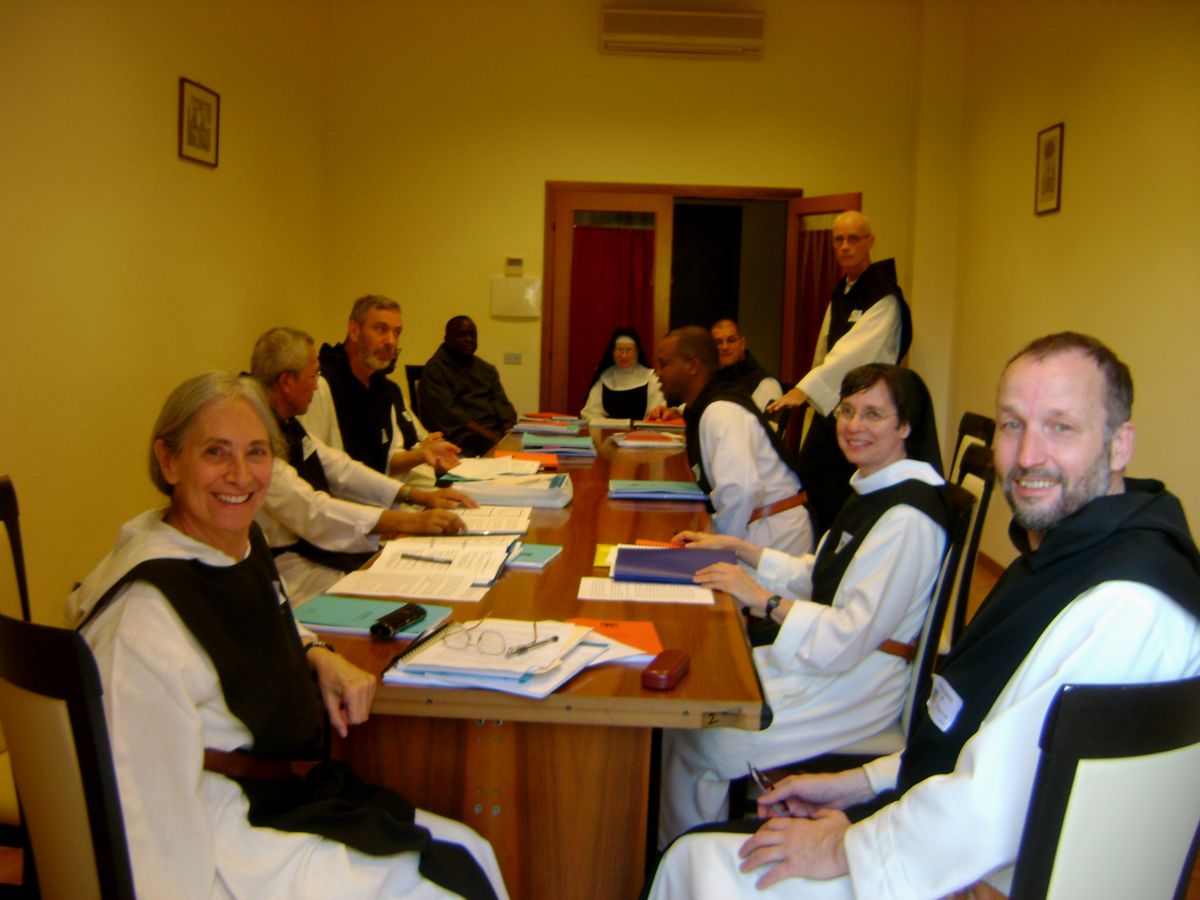“There is a real danger that we miss the essential. What do we want to live and what do we actually live?” These words are from the Abbot General’s conference on the theme of ‘increasing fragility’ given at our recent General Chapter (9/14/2014). It seems to me that in the ordinariness of each day it is easy for us to ‘miss the essential’, the essence of the monastic path, which is based on the gospel. To reflect, then, on what we desire to live paralleled with an honest reflection on what we actually live offers a healthy and challenging review of our community life together.
Sr Kathy (left) in committee meeting at General Chapter of OCSO, Assisi 2014Such honest reflection I think points to where we need conversion as a community: in our relations with one another, in how we meet the demands of work, of our collective poverty, of our increased fragility. On the other hand, such reflection also calls us to assess and acknowledge our strengths, the gifts, and the beauty God has bestowed upon us and on this place. We can ask ourselves such questions as: are we a community of gratitude or one of complainers? Are we a community that is graced with resiliency, ready to begin anew everyday? Remember the desert story: ‘It was said of Abba Poeman that everyday he made a new beginning’. Are we truly open to conversion and change? Are we ready to have our hearts broken open so that Christ’s love, the love embodied in the gospel way can expand and deepen amongst us? Are we really committed to become more Christ-like in all that we are and all that we do?
Dom Eamon, at the end of his conference, used the image from the jargon of the computer world of ‘default setting’. I think it is an apt image as we review our individual and community lives. Where do we default in our inner lives: into hopelessness and despair, into murmuring and complaining, into harsh criticism, or into gratitude, hope, compassion, into ‘the joy of the gospel’ (to quote the title of Pope Francis’ apostolic exhortation)? It is important to ‘notice’…to let each silent breath we take to help us feel, sense, or perceive what are the predominant movements or what is the tenor or mood in our inner lives. When we notice that we default into the negative…or into fear or anxiety…what do we do? Do we engage it or do we pray, hanging on to our ‘mustard seed of faith’? Do we use the spiritual tools we have available to importune the grace of God to shift this default setting, a setting, which can be so normal, so commonplace because it has ruled us for such a long, long time? This negative default setting could also be called our ‘old tapes’, our tapes that re-wind and re-wind with their stale tonality and same old verbiage…perhaps we could also call this negative default the onslaught of thoughts that Sr. Suzanne spoke about in her talk several weeks ago…and so God reminds us that, ‘my thoughts are not your thoughts…’ And God’s thoughts, the small still voice of the Spirit, will always be there speaking wisdom, breathing forth a healing word, the Incarnate Word, the Word of Life, the Word, which is our salvation.
Dom Eamon takes this pithy text from 1 Thessalonians as a default: “Be joyful always, pray continuously, give thanks in all circumstances, for this is God’s will for you in Christ Jesus” (1Thess 5:16-18). Imagine that the reality of these words would become our default: what we would return to over and over…imagine our consciousness defaulting into joy, prayer, giving thanks. Is this not the medicine we need individually and as a community? If we are truly faithful to our vocation then our lives are to be gospel based, Jesus based. And this means first of all to notice…simply notice where we default. And this will point to what we need to do to re-find ourselves, to re-root ourselves in our quest to become more and more like the Incarnate One who is the fullness of God’s love.
The default effect: the option that a chooser receives if she or he does nothing… let us then choose ‘life’, let us take on the mind and heart of Christ.
Now Is the Day of Salvation
We began Lent with the imposition of ashes on our forehead. A profound ritual reminding us of the mystery that we are living: our birth, death, and the entrance into


